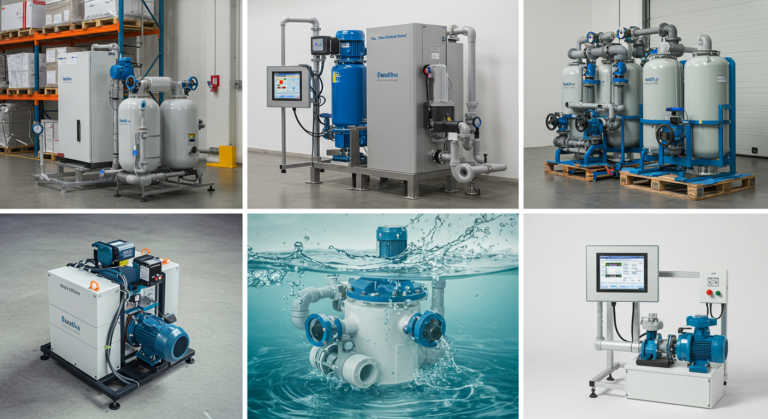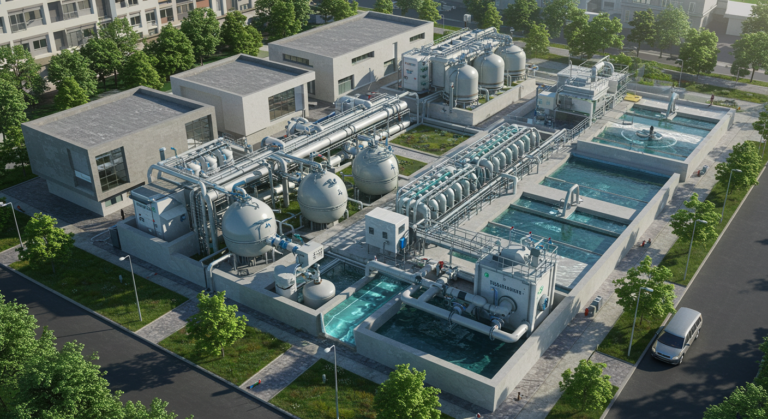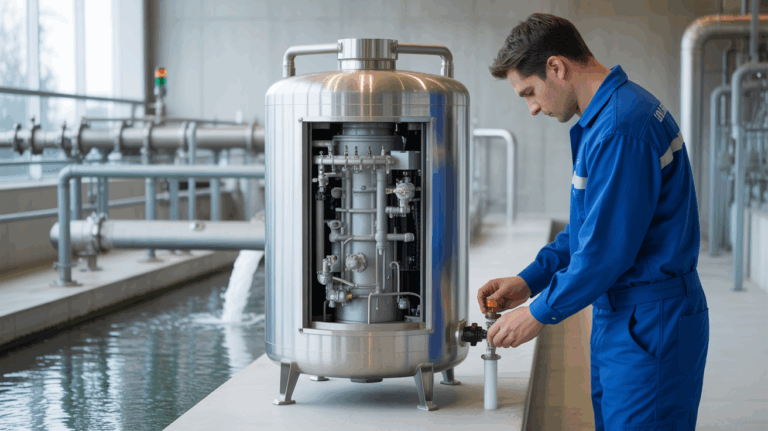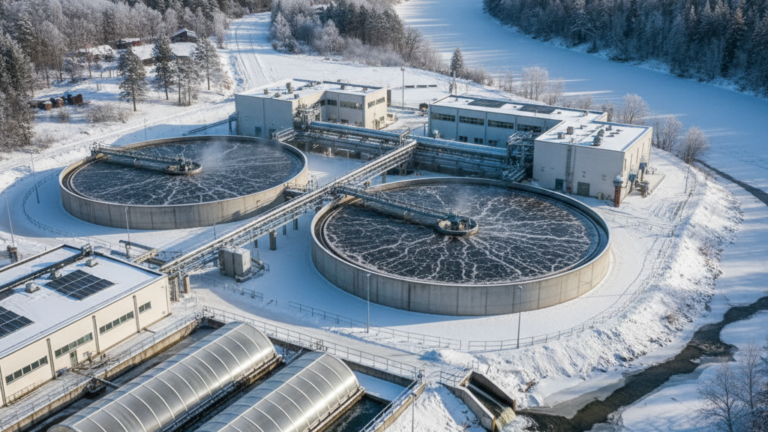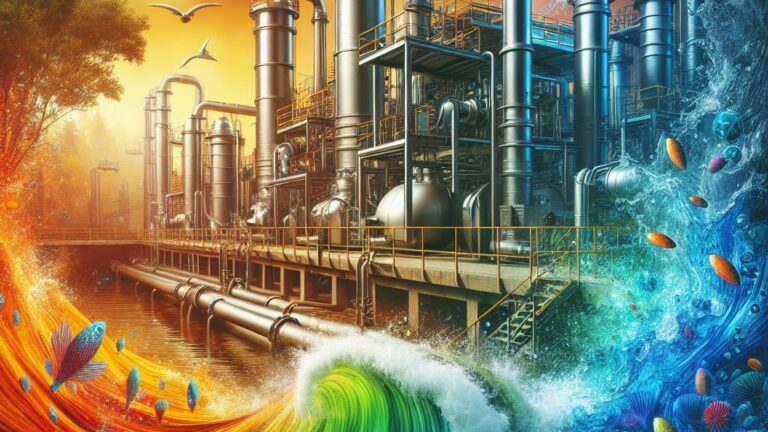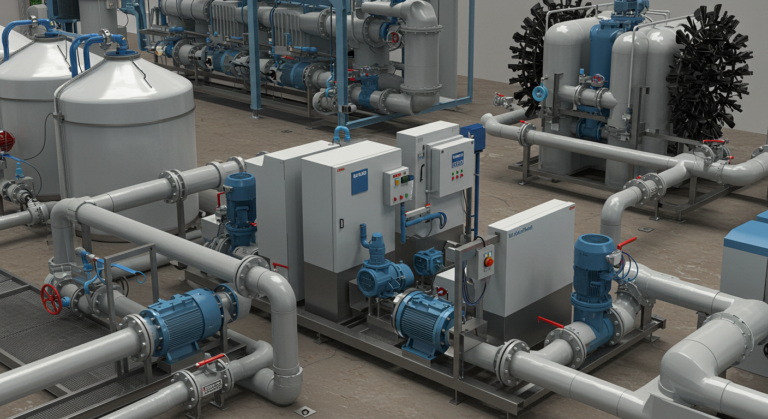Wastewater Treatment Products
Effective wastewater treatment is crucial for maintaining environmental health and ensuring public safety. Wastewater treatment products are designed to facilitate the treatment of wastewater from various sources, including industrial wastewater and domestic wastewater. These products are integral components of wastewater treatment systems, such as municipal wastewater treatment plants and sewage treatment plants. The proper functioning of a wastewater treatment plant relies on advanced technologies and processes that address different types of wastewater. By utilizing efficient wastewater treatment solutions, communities can minimize the negative impact of waste on ecosystems while promoting sustainable water management practices.
Importance of Effective Wastewater Treatment
Effective wastewater treatment is crucial for maintaining public health and environmental sustainability. Municipal wastewater and industrial waste contain harmful pollutants that can contaminate local water sources if not appropriately processed. Wastewater treatment products, including activated sludge systems, utilize chemicals and biological processes to break down sewage and waste. By treating waste water, communities can ensure the production of potable water and protect ecosystems.
The implementation of sound waste-water treatment practices significantly mitigates the risk of waterborne diseases. Proper management of waste minimizes environmental impact by preventing toxins from entering waterways. Wastewater treatment products play a pivotal role in the process. They enhance the efficiency of water treatment facilities, allowing them to handle diverse waste streams effectively. The result is cleaner water and healthier habitats, benefiting both communities and wildlife.
Key Components of Wastewater Treatment Products
Effective wastewater treatment relies on several key components that ensure the purification process is successful. Wastewater Treatment Products often incorporate chemical technology to optimize the breakdown of organic chemicals and chlorinated hydro-carbons. For instance, the use of soda ash assists in balancing pH levels within treatment plants, promoting the degradation of contaminants. Hydrochloric acid may also be utilized to adjust acidity, further enhancing the treatment process and ensuring that the resulting water is safe for potential reuse or discharge.
The infrastructure of treatment plants is designed to facilitate the efficient removal of pollutants while recycling valuable resources. Specific Wastewater Treatment Products are tailored to address various contaminants and may include advanced filtration systems and bioreactors. These products are vital for converting wastewater into a commodity that meets safety standards for drinking water. By integrating these components, treatment plants can reliably manage wastewater, minimizing environmental impact while safeguarding public health.
- Developments in membrane technology for enhanced filtration efficiency
- Use of aerobic and anaerobic processes for effective biological treatment
- Application of UV light for disinfection to kill pathogens
- Implementation of nutrient recovery systems for sustainable resource management
- Utilization of real-time monitoring systems for optimal treatment performance
- Integration of green chemistry approaches for eco-friendly solutions
- Customization of treatment processes based on specific wastewater characteristics
Types of Wastewater Treatment Processes
Understanding the various methods of wastewater treatment is crucial for effective management of water resources. Wastewater treatment products play a vital role in removing toxic compounds from wastewater, ensuring safe disposal and reducing pollution. Techniques such as the use of chlorination for disinfection and the application of surfactants help break down contaminants. Aerobic digesters are particularly effective in treating high concentrations of organic matter, transforming it into biodegradable substances. The careful handling of chemical processes can neutralize acidic components, ensuring the effluent meets regulatory standards before release into the environment. Each method is designed to optimize the quality of water, emphasizing the importance of innovative wastewater treatment products in today’s sustainability efforts.
Biological Wastewater Treatment Methods
Biological treatment methods leverage microorganisms to achieve biological degradation of organic matter found in wastewater. These processes are essential in the management of sludges produced during wastewater treatment operations. Anaerobic digesters play a crucial role in these methods by breaking down organic material, significantly reducing the volume of sludge while producing biogas as a byproduct. The combination of effective wastewater treatment products and biological processes helps address various wastewater treatment issues and enhances overall wastewater treatment solutions.
The effectiveness of biological wastewater treatment largely depends on the balance of nutrients and chemicals involved in the process. Wastewater treatment chemicals, such as aluminum sulfate, are often utilized to aid in coagulation and improve the clarity of the treated effluent. Chloride levels must also be monitored to ensure they do not inhibit microbial activity, which is vital for optimal biological degradation. By integrating the right wastewater treatment products with robust biological processes, facilities can improve their operational efficiency and contribute positively to environmental sustainability.
| Treatment Method | Microorganisms Used | Advantages |
|---|---|---|
| Aerobic Treatment | Bacteria (e.g., Pseudomonas) | Effective in breaking down high organic loads; produces stable byproducts. |
| Anaerobic Digestion | Methanogens | Reduces sludge volume; produces biogas which can be used for energy. |
| Activated Sludge Process | Various bacteria | Efficient in removing nutrients; adaptable to different wastewater types. |
| Biofiltration | Fungi and bacteria | Simple operation; good for treating low concentration pollutants. |
Natural Wastewater Treatment Solutions
Natural wastewater treatment solutions utilize naturally occurring processes to treat both domestic and municipal wastewater. These methods often rely on microbial activity to break down contaminants, reducing the need for harsh wastewater treatment chemicals. Popular wastewater treatment products in this category include constructed wetlands and biofilters. These systems not only meet the wastewater treatment needs effectively but also provide a sustainable alternative to traditional mechanical systems. Wastewater treatment experts advocate for these solutions due to their low operational costs and minimal environmental impact.
The efficiency of natural processes in the wastewater treatment process makes them a reliable choice for addressing various wastewater treatment needs. For instance, utilizing plants and soil microorganisms can enhance the treatment of pollutants while promoting biodiversity. Wastewater treatment equipment in these systems is designed to maintain optimal conditions for microbial growth. This approach often results in perfect wastewater treatment outcomes that align with environmental and regulatory standards. As industries and municipalities seek cost-effective solutions, natural methods are gaining recognition as essential components of comprehensive wastewater treatment systems.
Wastewater Treatment Plants and Their Functionality
Wastewater Treatment Products play a crucial role in addressing the diverse needs of wastewater systems. Effective wastewater solutions are essential for managing the complexities of wastewater processes, particularly within both industrial wastewater systems and biological wastewater systems. Each wastewater plant is designed to tackle specific wastewater challenges, ensuring that treated water meets safety standards. Case studies of successful wastewater systems highlight the importance of integrating modern technologies and methodologies to enhance treatment efficiency. Understanding these dynamics allows for the development of tailored wastewater supply strategies that not only meet regulatory requirements but also promote environmental sustainability.
Structure and Design of a Wastewater Treatment Plant
The structure and design of a wastewater treatment plant are crucial for ensuring effective treatment of various types of wastewater. A well-designed wastewater plant incorporates advanced wastewater treatment products that address the specific needs of acidic wastewater and industrial waste water. The integration of industry-leading wastewater technology enhances the efficiency of waste-water treatment systems, ensuring reliable performance in water clarification. The layout of the facility accommodates various treatment stages, combining physical, biological, and chemical processes to optimize water purification.
Effective wastewater treatment systems are designed with a focus on flexibility and scalability, allowing for adaptation to changing regulations and increasing waste volumes. Engineering expertise plays a pivotal role in the configuration of an industrial wastewater plant, as it must handle diverse waste streams while maintaining compliance with environmental standards. The careful selection of water treatment system components and the use of appropriate water clarification chemicals are vital for achieving optimal results. Strong wastewater expertise also contributes to the ongoing maintenance and operation of these complex facilities, ensuring a sustainable approach to water resource management.
Role of Chemicals in Wastewater Treatment
Chemical agents play a crucial role in enhancing the efficiency of wastewater treatment products in various waste water systems. These chemicals target specific waste compounds, facilitating processes such as ammonia removal and helping to break down organic material. During the treatment process, chemicals can be introduced to optimize the performance of sludge bio-reactors, addressing sludge removal needs effectively. This ensures that treated water meets quality standards for reuse and drinking water applications.
The selection of chemicals directly affects the outcomes of treatment applications in wastewater management. For instance, the introduction of chm-207 wastewater bacteria can significantly improve the degradation of pollutants. This demonstrates how the right treatment products can enhance the overall treatment efficiency and stability of the treatment process. Ultimately, the strategic use of chemicals contributes to effective sludge removal and the successful functioning of waste water systems.
Advances in Water Treatment Technologies
The landscape of wastewater management is rapidly evolving with the introduction of innovative wastewater treatment products. These advancements often focus on enhancing biological treatment processes that effectively handle diverse waste streams. Many chemicals are employed in treatment systems, including common chemicals and chlorinated cleaners, which play crucial roles in the removal of contaminants. To meet varying needs, treatment equipment is designed to optimize performance while ensuring proper treatment products are used in the process. Water separation sales also reflect the increasing demand for efficient solutions, highlighting the significance of staying updated with the latest technologies in wastewater treatment.
Innovative Wastewater Treatment Products on the Market
The market for wastewater treatment products has seen significant innovation, leading to more effective solutions for treatment plants. New cleaners and chemical solutions are now available that enhance the efficiency of biological treatment processes. These products help in the degradation of solids and facilitate the breakdown of degradable compounds. Bio-reactors equipped with advanced technology can optimize performance in various environmental applications, ensuring that water collection systems are managed effectively.
To meet the growing demand for sustainable practices, many companies are developing cutting-edge wastewater treatment products. These include specialized chemical supplies designed to maximize the treatment process while minimizing environmental impact. Enhanced systems not only improve water quality but also support the efficient operation of treatment plants. The ongoing evolution of wastewater treatment products reflects a commitment to addressing the challenges of modern water management.
The Impact of Technology on Wastewater Supply Systems
Technological advancements in wastewater supply systems have significantly enhanced the efficacy of wastewater treatment products. These innovations focus on improving metals removal and increasing the efficiency of oxidation processes, such as chlorine oxidation. Water experts increasingly utilize polymer chemicals and anti-foam chemical agents to optimize the treatment process. The introduction of these products aids in solids/liquids separation, ensuring that harmful substances are effectively removed from biological liquids, ultimately leading to cleaner effluents.
The integration of technology into wastewater management also targets the elimination of toxic and following toxic compounds. Used acid and other chemicals play vital roles in these advanced treatment systems. Enhanced monitoring systems enable real-time assessments, allowing for prompt adjustments to treatment protocols. These improvements not only foster compliance with environmental regulations but also promote sustainable practices in managing wastewater, ensuring a healthier ecosystem for future generations.
- Enhanced monitoring systems provide real-time data for better decision-making.
- Advanced treatment technologies reduce operational costs and improve overall efficiency.
- Automated processes minimize human error and increase safety in treatment plants.
- The implementation of smart sensors facilitates early detection of system failures.
- Reduced environmental impact through more effective nutrient removal and resource recovery.
- Increased public awareness and involvement through technology-driven communication platforms.
- The transition toward circular economy practices in wastewater reuse and resource recovery.
Environmental Impact of Wastewater Management
Effective management of wastewater plays a crucial role in protecting environmental quality and public health. Wastewater Treatment Products, such as arikleen cleaners and microbial products, are essential for addressing soluble contaminants and ensuring safe discharge into water bodies. The use of magnesium hydroxide slurry offers effective foam prevention and corrosion prevention solutions, helping to maintain the integrity of treatment systems. Chemical manufacturers provide various formulations and concentrations tailored to meet unique water needs, enhancing the efficacy of the treatment process. Proper application of these products leads to reduced environmental impact and supports sustainable practices in wastewater management.
Benefits of Sound Wastewater Treatment Practices
Sound wastewater treatment practices are essential for ensuring that wastewater is treated effectively, minimizing environmental impacts. The use of advanced wastewater treatment products enhances biological degradation capabilities, allowing for a more efficient breakdown of solids and liquids. These processes can transform odorous compounds into non-hazardous neutralizers, making the effluent safer for discharge. Dry polymer flocculants play a crucial role in sludge thickening, enabling the recovery of resources that can be reused or safely disposed of.
Implementing these practices not only addresses immediate chemistry needs but also provides workable solutions for wastewater management. Various chemical compounds can be employed to optimize treatment, ensuring that pollutants are effectively removed. The integration of innovative wastewater treatment products contributes to sustainable practices, benefiting both ecosystems and communities. By focusing on sound methodologies, wastewater treatment processes can yield significant positive outcomes for public health and the environment.
Conclusion
Effective wastewater treatment is critical for managing problem compounds that pose risks to the environment and public health. Wastewater Treatment Products play a vital role in eliminating stubborn pollution through various applications, such as bio-remediation and chemical separation techniques. By incorporating innovative solutions, these products not only enhance treatment efficiency but also contribute to corrosion prevention in wastewater infrastructure. Utilizing facilities like POTWs and lagoons further aids in optimizing disposal costs while ensuring that treated water meets regulatory standards. The integration of advanced technologies within wastewater treatment systems signifies a proactive approach to sustaining water quality and protecting ecological resources.
FAQS
How can wastewater treatment chemicals be effectively utilized in wastewater webinars to enhance learning on industrial wastewater treatment?
Wastewater treatment chemicals play a crucial role in industrial wastewater treatment by helping to achieve reliable wastewater treatment outcomes. In these wastewater webinars, participants can explore various concentrations of commodity chemicals that address specific wastewater needs, including solids degradation. A wastewater case study can illustrate how these chemicals eliminate contaminants and recover resources from domestic wastewater treatment processes, showcasing industry-leading wastewater expertise.
What are the key benefits of using wastewater plants in terms of needs treatment and how do they contribute to recovered resources that eliminates environmental impacts?
Wastewater plants play a crucial role in addressing the needs treatment of wastewater effectively. They help in the removal of pollutants and recovery of resources, which in turn eliminates the environmental impacts associated with untreated wastewater. By treating wastewater, these plants not only recycle water but also recover valuable resources, fostering a more sustainable approach to water management.
How do wastewater treatment systems contribute to the recovery of resources from wastewater?
Wastewater treatment systems play a crucial role in recovering resources such as water, nutrients, and energy from wastewater. By implementing effective treatment processes, these systems help transform treated wastewater into recovered resources that can be reused, thereby reducing the environmental impacts associated with wastewater disposal.
What are some innovative technologies in wastewater treatment that help improve efficiency and sustainability?
Innovative technologies in wastewater treatment, such as membrane bioreactors, advanced oxidation processes, and anaerobic digestion, help improve efficiency and sustainability by enhancing resource recovery, reducing energy consumption, and minimizing environmental impacts during the treatment process.
What are the essential considerations for selecting wastewater treatment products to optimize operational performance in municipal wastewater facilities?
Selecting wastewater treatment products for municipal wastewater facilities involves several essential considerations, including evaluating the effectiveness of the product in treating various types of wastewater, understanding the regulatory compliance requirements, and assessing the overall cost-effectiveness. Additionally, it is crucial to consider the environmental impact of these products and their ability to support sustainable practices while ensuring the operational performance of the treatment facilities.


